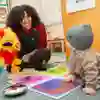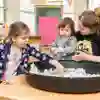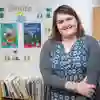



Develop your knowledge and understanding of working with babies and young children on this foundation degree for practitioners.
Taught in the evenings, you'll be able to balance your work or volunteering role with young children while you study. If you’re a child-minder, teaching assistant, pre-school learning leader or an early-years practitioner, or other role with 0-8s, you’ll benefit from the professional development opportunities that go hand in hand with this foundation degree.
You’ll learn through expert-led learning linking theory to practice and explore your development as a practitioner.
About this course
This course is designed to meet the exact but changing needs of employers in the early years sector. So you’ll gain the valuable skills you need to progress within childhood education and care.
You’ll study a broad range of topics. First year modules cover health and wellbeing, play and learning, and inclusion and diversity. This course includes an optional Early Years Educator (EYE) pathway too.3
Build practical skills while you learn, carrying out part of your training in your own workplace. You could access our on-campus simulated early years learning environment. And study for accredited Forest School certification, too. This prepares you to work outside with children, taking into account a range of extra needs, and gives you a valuable extra qualification.
You'll develop essential skills and attributes that employers in the sector value while gaining experience in an academic background. And gain the expertise and knowledge to apply for a top-up qualification with Graduate Practitioner Status, or other professional education route.
Could you teach us a thing or two?
Module options
Each year, you’ll study modules worth a certain number of credits, and you need 120 credits per year. Most modules are 20 credits – so you’ll study six modules each year. Some longer modules, such as a dissertation, are worth more. In these cases, you’ll study fewer modules - but the number of credits will always add up to 120. Some modules are compulsory, some are optional, so you can build a course that’s right for you.
Filters
Early Child Development: Theory into Practice
This module will introduce you to the evidence-based principle of child development, giving due consideration to play and learning, children’s rights, diversity, equity and inclusion. You'll link theory and practice through the evaluation of various observation techniques for working with babies and young children.
compulsory
20 credits
Foundations for Academic Practice
This module introduces effective learning strategies and provides opportunities to develop the skills required for study in higher education. You will answer questions like: How do I reference accurately? What is a valid source of information? How do I present my work? And what is plagiarism?
compulsory
20 credits
Professional Reflective Practice - Health and Wellbeing
This module is focused on the concept of listening to babies' and young children's voices and behaviours, as they become aware of their own agency and independence, and your role in this developmental process.
compulsory
20 credits
Professional Reflective Practice: Learning Journeys
Develop your skills in reflective learning on the practice of assessment and its purpose when working with babies and young children. You will have the opportunity to explore your own professional values and ethics through the key themes of professional responsibility and accountability.
compulsory
20 credits
Safeguarding and Promoting the Wellbeing of Babies, Children and Families
You'll examine the current statutory framework and the impact this has on babies, young children, families and practitioners. You will explore the themes of leadership, communication and multiagency working whilst reflecting on previous case studies and how these have shaped current practice.
compulsory
20 credits
Social Inclusion
You'll be introduced to social inclusion and the impact this can have on babies, young children and families, you will be exploring and reflecting on national and international policy and legislation and how these been developed to support inclusive practices that can mitigate barriers to inclusion.
compulsory
20 credits
Approaches to Research
Begin your journey with the exciting opportunity to delve into and explore a contemporary issue that you feel passionate about and is relevant to your studies. The module will support you in developing the skills required to design and carry out a small scale research project in Trimester 2.
compulsory
20 credits
Play and Learning
How do adults and environments in early years settings support young children’s learning? In this module you will explore the power that play and everyday experiences have on the development of babies and young children. You will reflect on the role you and others have in supporting them to make sense of the world.
compulsory
20 credits
Professional Reflective Practice: Transitions
Weaning? Toilet Training? Moving to school? Bereavement? All of these transitions happen daily in life but what impact can they have? Through this module you will be introduced to and supported in exploring the impact transitions can have on babies, young children and families developing further understanding of the role these can have in the ecological context of child development.
compulsory
20 credits
Our facilities




Our academics
Our team of highly respected and experienced tutors are all experts in their specialisms.
Taught by a team of experts in the fields of education, social care, health, inclusion and therapeutic approaches, you’ll gain real, practical knowledge that will be invaluable in your future career.

Kath Hickman
Programme Director
Kath has over 20 years’ experience working with children and families including childminding and community playgroups. She developed childcare provisions with Sure Start, has a keen interest in outdoors learning and is part of our Forest School team.

Kerrie Lee
Lecturer
An experienced early years practitioner, Kerrie's research focuses on how environment, space and place interact and shape the lives of young people. She is working on a consultation for new projects to support early years in museums and galleries.
Entry Requirements
Fees & Funding
How much is it?

Future prospects
Our degrees reflect the high demand for well-trained professional practitioners. The range of opportunities for graduates in children’s services is varied and wide.
You’ll be able to go on to further study, such as a top-up programme which may include Graduate Practitioner Status.
You could also go on to support children with additional needs or secure community, social or family support work, or progress as an early years practitioner or work in community services.
Become part of the next generation of futuremakers
Like what you've seen? Then it's time to apply.
The standard way is to apply through UCAS. This will give you the chance to showcase your skills qualities and passion for the subject, as well as providing us with your academic qualifications.
Not ready to apply yet?
Visit our next Open Day, and see all that Hull has to offer for yourself. Talk to our lecturers about your subject, find out what university is really like from our current students, and take a tour of our beautiful campus and amazing facilities.
You may also be interested in...
94.9% employability (Education Studies) UK domicile full-time first degree leavers; Higher Education Graduate Outcomes statistics, for the academic year 2021/22, published by the Higher Education Statistics Agency June 2024.
Joint 2nd in the UK for Value Added - The Guardian 2025
EYE status is a Department of Education approved qualification that allows you to be recognised as a ‘full and relevant’ practitioner in the early years sector. To achieve EYE status, you will need to complete a portfolio of evidence and have level 2 maths by the end of the course.
All modules presented on this course page are subject to availability and this list may change at any time.